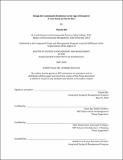| dc.contributor.advisor | Jason Jay and Miho Mazereeuw. | |
| dc.contributor.author | Qin, Yiyuan. | en_US |
| dc.contributor.other | Massachusetts Institute of Technology. Integrated Design and Management Program. | en_US |
| dc.contributor.other | Massachusetts Institute of Technology. Engineering and Management Program. | en_US |
| dc.contributor.other | System Design and Management Program. | en_US |
| dc.coverage.spatial | nwpr--- | en_US |
| dc.date.accessioned | 2021-10-08T16:59:29Z | |
| dc.date.available | 2021-10-08T16:59:29Z | |
| dc.date.copyright | 2020 | en_US |
| dc.date.issued | 2020 | en_US |
| dc.identifier.uri | https://hdl.handle.net/1721.1/132856 | |
| dc.description | Thesis: S.M. in Engineering and Management, Massachusetts Institute of Technology, System Design and Management Program, May, 2020 | en_US |
| dc.description | Cataloged from the official version of thesis. | en_US |
| dc.description | Includes bibliographical references (pages 77-87). | en_US |
| dc.description.abstract | In September 2017, Puerto Rico, home to 3.2 million people, suffered catastrophic damages as category-5 Hurricanes Irma and Maria made direct landfalls on the Island. Their effects on people's health and safety were devastating and long-term. In the face of climate change, places like Puerto Rico are likely confronted with more frequent and more destructive natural disasters. The need to better prepare the Island for future disasters is immense and urgent. Combining primary and secondary research, this thesis applies a human-centered and system-minded design approach to identify and analyze the current strengths and gaps in the disaster response and recovery efforts in Puerto Rico after Hurricane Maria. I conducted interviews and participatory observations with individuals and organizations in the field, ranging from community-based organizations to aid agencies. This thesis reveals that although Hurricane Maria touched virtually all parts of the Island, the vulnerable populations were disproportionately affected. In response to the inefficiencies of local governments and federal agencies, citizens and community groups emerged to respond to the aftermath of Hurricane Maria. However, there is a clear gap in the current disaster management system in engaging and empowering citizens and communities to respond to the growing challenges of natural disasters. Based on these findings, this thesis lays out a set of design recommendations for leveraging disaster information and knowledge management systems to promote collaboration across key actors to enhance disaster resilience in Puerto Rico and other relevant contexts. | en_US |
| dc.description.statementofresponsibility | by Yiyuan Qin. | en_US |
| dc.format.extent | 87 pages | en_US |
| dc.language.iso | eng | en_US |
| dc.publisher | Massachusetts Institute of Technology | en_US |
| dc.rights | MIT theses may be protected by copyright. Please reuse MIT thesis content according to the MIT Libraries Permissions Policy, which is available through the URL provided. | en_US |
| dc.rights.uri | http://dspace.mit.edu/handle/1721.1/7582 | en_US |
| dc.subject | Integrated Design and Management Program. | en_US |
| dc.subject | Engineering and Management Program. | en_US |
| dc.subject | System Design and Management Program. | en_US |
| dc.title | Design for community resilience in the age of disasters : a case study in Puerto Rico | en_US |
| dc.type | Thesis | en_US |
| dc.description.degree | S.M. in Engineering and Management | en_US |
| dc.contributor.department | Massachusetts Institute of Technology. Integrated Design and Management Program | en_US |
| dc.contributor.department | Massachusetts Institute of Technology. Engineering and Management Program | en_US |
| dc.identifier.oclc | 1263245270 | en_US |
| dc.description.collection | S.M.inEngineeringandManagement Massachusetts Institute of Technology, System Design and Management Program | en_US |
| dspace.imported | 2021-10-08T16:59:29Z | en_US |
| mit.thesis.degree | Master | en_US |
| mit.thesis.department | SysDes | en_US |
